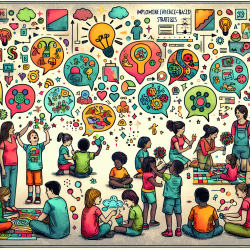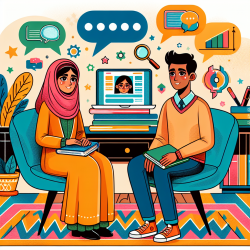Effective communication is fundamental to a child's development, particularly for those with speech and language difficulties. Participation in recreational activities, such as day camps, provides an excellent opportunity for children to develop these essential skills. However, children with communication difficulties often require additional support to engage fully in these activities. This blog outlines a recent study published in the Canadian Journal of Speech-Language Pathology & Audiology that addresses this issue by developing a training program for day camp counselors to enhance their ability to support children with communication challenges.
Understanding the Need
Approximately 10% of children aged 6 to 12 years experience communication difficulties (Norbury et al., 2016). These challenges can stem from various conditions, including developmental language disorders, autism spectrum disorders, intellectual disabilities, and physical impairments. When participating in group activities, these children benefit significantly from adult support to navigate social interactions and understand the expectations of the activities. In day camps, young counselors often lack the training needed to provide this support effectively, which can hinder the inclusive experience for children with communication difficulties.
The Role of Day Camp Counselors
Day camp counselors play a crucial role in facilitating communication and social interactions among children. They can help children understand activities better by demonstrating and explaining what is expected of them. Additionally, counselors can support children in expressing themselves by asking questions that help clarify their thoughts and feelings. Given the importance of these interactions, it is essential to equip counselors with the strategies they need to support children with communication difficulties effectively.
Developing the Training Program
The training program was developed in response to a request from a community-based recreational organization, the Patro Roc-Amadour, in Quebec. The program aimed to provide day camp counselors with strategies to promote communication among children with speech and language difficulties. The development process involved collaboration between researchers, speech-language pathologists, and the community partner. The program was piloted and refined based on feedback from the counselors who participated in the initial training sessions.
Key Components of the Training
The training program, titled "Mieux communiquer pour participer" (Better Communication for Participation), consists of both theoretical and practical components. The theoretical section covers the basics of communication and the specific challenges faced by children with communication difficulties. It also includes strategies for supporting communication, such as observing non-verbal cues, asking clarifying questions, and helping children find alternative ways to express themselves.
Practical Application
The practical component of the training involves interactive activities and role-playing exercises to help counselors apply the strategies in real-life scenarios. For example, counselors practice interpreting non-verbal cues and using visual aids to support communication. These activities are designed to make the training engaging and relevant to the counselors' experiences at the day camp.
Evaluating the Training Program
The effectiveness of the training program was evaluated through feedback from the counselors who participated in the sessions. The majority of participants reported that the training was relevant and helpful for their work with children. They felt more confident in their ability to support children with communication difficulties and appreciated the practical strategies provided.
Conclusion
The development and implementation of the "Mieux communiquer pour participer" training program highlight the importance of equipping day camp counselors with the skills they need to support children with communication difficulties. By providing evidence-based strategies and practical training, we can create more inclusive recreational environments where all children can thrive. For more information on the training program and to access the materials, please visit the Canadian Journal of Speech-Language Pathology & Audiology or contact the authors directly.
To read the original research paper, please follow this link: Canadian Journal of Speech-Language Pathology & Audiology.










